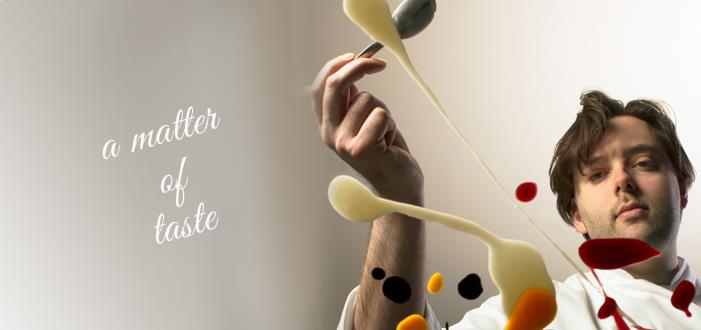
A Matter of Taste
Like Eat This New York, A Man of Taste concentrates itself on the New York food scene. But unlike the former film, the latter shifts its lens on the theatre of the food itself, versus the construction of the stage.
Paul Liebrandt is the chef in particular. The film follows a 6 year arc of his attempt to lead a restaurant using his avant-garde cuisine. His creativity was very warmly received by critics and fellow chefs, yet it had the most difficult time to be accepted at his first stop in the documentary. The restaurant, while receptive to his artistry, wound up having to constrain the menu options because their patrons preferred burgers and fries in the recession economy.
No matter to Paul. Yes, it disappointed him. Yes, it was not part of his ambition. Yet it was part of his grand plan. What do I mean? The door closed on him, forcing him to move in another direction, to complete his pursuit of happiness.
Next came a restaurant called Gilt. The documentary makes clear that while he was the executive chef, his decisions were still constrained. After all, he was not the proprietor, only a mere employee. Thomas Keller suggested that there was some strong personal growth in his cuisine, yet it tended to be ostentatious. This ostentation was not seen favorably with the new New York Times critic, who preferred “comfort food” as Paul would say. The restaurant was dinged with a 2-star rating. Paul did not last.
Was this too a disappointment? Absolutely. Yet it was again another step in the right direction for him. The fascinating thing about the orientation humanity has toward the passage of time is in the uncertainty of the future based on past actions. In the present, past actions can seem to stall, regress, even destruct the lives of those aiming themselves at ideals for themselves. Yet intriguingly, while one sets an ideal for themselves to become, their livelihood manifests itself toward that ideal. Their decisions they make are all attempts at achievement. Even if they result unwittingly in failure, these failure is temporary. The pain can be endured. It is a learning lesson.
And the result of this trek was in the establishment of one of the best restaurants in New York City, Corton. Paul was able to scale down his flamboyance, perhaps as a learned lesson from his creative attempts at his previous stop. Paul also became co-owner of the kitchen, a first for him. And thus, he became the director of the menu, which arguably became more refined and mature.
He received an unprecedented 2-stars from Michelin.
Grade: A

